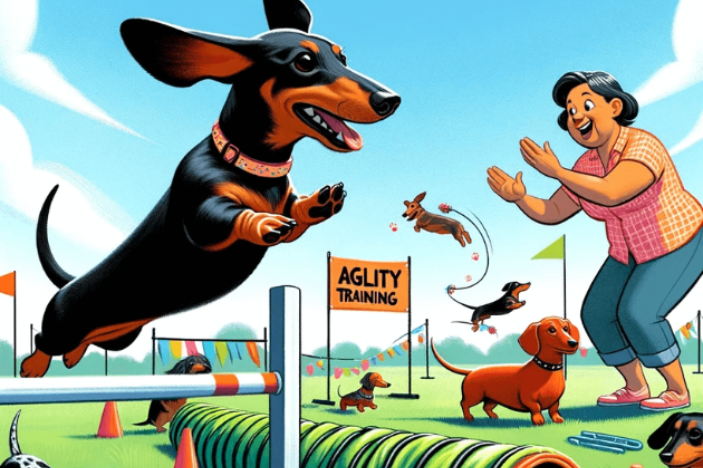How To Stop Dachshund Behavior Problems?
Dachshunds are loyal and loving dogs, but they can be prone to certain behavior problems, including aggression, barking, digging, and separation anxiety.
Here are some tips to help you stop these behavior problems:
Socialization
Dachshunds need to be socialized from a young age, so they become comfortable around other dogs, people, and new environments.
Training
Consistent training will help your Dachshund understand what is expected of them and what behaviors are unacceptable. Use positive reinforcement techniques like treats and praise to encourage good behavior.
Exercise
Dachshunds are active dogs and need regular exercise to keep them physically and mentally healthy. Taking your dog for a walk, playing fetch, or giving them puzzle toys to solve can help reduce their behavior problems.
Prevent boredom
Dachshunds can become bored easily, which can lead to destructive behaviors. Provide them with toys, puzzles, and other forms of mental stimulation to keep them entertained.
Manage separation anxiety
Dachshunds are prone to separation anxiety, which can cause destructive behavior when left alone. Gradually increase the time that you leave your dog alone and provide them with toys, treats, and a comfortable space to help them feel more relaxed.
Seek professional help
If your Dachshund’s behavior problems are severe, consider seeking the help of a professional dog trainer or behaviorist. They can provide personalized advice and training to address your dog’s specific issues
Common Dachshund Behavior Problems
There are several common Dachshund behavior problems, including fear, aggression, and other health issues. In the case of fear, the dog may be afraid of strangers or may be afraid of loud noises. He may also be afraid of sudden movements or changes in the environment.
Aggression can cause problems if the dog bites someone. Other common Dachshund behavior problems include separation anxiety, destructive chewing, excessive barking, and house soiling. Fear is a common problem in Dachshunds.
This is why they sometimes hide under furniture or other places they think they might be safe. They may also hide under beds or behind couches.
The best thing that you can do is to work with your dog and find out why he is scared. Thus, you will need to help him with overcoming his anxiety.
You can also ask your vet to suggest an appropriate training method to help your dog overcome his fears.
Dachshunds Discipline
Dachshunds are intelligent dogs that can be trained with positive reinforcement methods.
Here are some tips for disciplining your dachshund
- Be consistent: Dachshunds respond well to consistent training methods. Make sure that everyone in your household uses the same commands and rewards for good behavior.
- Use positive reinforcement: Reward your dachshund for good behavior with treats, praise, and affection. Avoid using physical punishment, as it can cause fear and aggression.
- Use a firm tone: When correcting your dachshund’s behavior, use a firm tone of voice. Avoid yelling or screaming, as it can cause your dog to become fearful or anxious.
- Be patient: Dachshunds can be stubborn, so it’s important to be patient when training them. Repeat commands and rewards consistently, and be patient as your dachshund learns new behaviors.
- Be proactive: Dachshunds can be prone to destructive behaviors if they become bored or restless. Make sure your dachshund gets enough exercise and mental stimulation, such as puzzle toys or training exercises, to prevent negative behaviors from developing.
Remember that training your dachshund is an ongoing process, and that positive reinforcement and consistency are key to a well-behaved dog. With patience and dedication, you can discipline your dachshund effectively and create a strong bond with your furry friend
Are Dachshunds disobedient
No, Dachshunds are not inherently disobedient. However, like all dogs, their behavior is influenced by a combination of genetic predisposition, Training, and socialization.
Dachshunds are intelligent and can be trained with positive reinforcement techniques to learn obedience commands and proper behavior.
It is important to note that Dachshunds are also known for their independent and stubborn nature, which can make them more challenging to train than some other breeds.
However, with patience, consistency, and positive reinforcement, Dachshunds can be well-behaved and obedient pets.
It is also essential to provide them with plenty of exercises and mental stimulation to keep them happy and content.
Deal with a stubborn Dachshund
Dealing with a stubborn Dachshund can be challenging, but with patience, consistency, and positive reinforcement, you can help your furry friend become more obedient and responsive. Here are some tips:
- Establish yourself as the leader: Dachshunds are naturally stubborn and independent, and they may challenge your authority if they do not recognize you as the leader. You can establish yourself as a leader by setting rules and boundaries and enforcing them consistently.
- Use positive reinforcement: Punishing a stubborn Dachshund can backfire and make the behavior worse. Instead, use positive reinforcement to reward good behavior. Treats, praise, and playtime are all great rewards for a Dachshund who listens and follows commands.
- Be patient and consistent: Dachshunds can take time to learn new behaviors and habits, so it’s important to be patient and consistent in your training. Practice commands regularly and provides lots of positive reinforcement for good behavior.
- Use short and simple commands: Dachshunds respond best to short and simple commands, so keep your training sessions brief and focused. Use clear and consistent language, and avoid using long sentences or complex phrases.
- Provide plenty of exercises and mental stimulation: A bored and restless Dachshund is more likely to be stubborn and difficult to train. Make sure your furry friend gets plenty of exercises and mental stimulation to keep them engaged and focused.
Remember, training a stubborn Dachshund requires patience, consistency, and positive reinforcement. With time and effort, you can help your furry friend become a well-behaved and obedient companion
Should I hit my Dachshund?
No, hitting your Dachshund or any other animal is not an appropriate or effective way to discipline or train them.
Physical punishment can cause physical harm, as well as emotional distress, fear, and aggression in your Dachshund.
These negative consequences can undermine the trust and bond between you and your pet, making it difficult for you to establish a healthy and positive relationship.
Instead of hitting your Dachshund, consider using positive reinforcement training techniques, such as rewarding good behavior with treats, praise, and affection.
You can also redirect your Dachshund’s behavior with toys or other activities that are appropriate for them.
It’s important to be patient, consistent, and compassionate with your pet, as this will help them learn and grow in a positive way.
If you’re having trouble training your Dachshund, consider seeking the help of a professional dog trainer or behaviorist
How do you calm a Dachshund?
There are several ways to calm a Dachshund, including:
- Provide a safe and comfortable environment: Ensure that your Dachshund has a comfortable place to rest and relax and that the environment is free from loud noises or other stressors.
- Exercise and playtime: Dachshunds are an active breed and need plenty of exercise and playtime. Regular walks and play sessions can help them burn off excess energy and reduce anxiety.
- Positive reinforcement training: Using positive reinforcement training techniques, such as rewarding good behavior with treats and praise, can help your Dachshund feel more relaxed and confident.
- Calming aids: There are several calming aids available for dogs, including pheromone sprays, calming collars, and herbal supplements. These can be effective in reducing anxiety and promoting relaxation.
- Massage and cuddles: Dachshunds are known for their love of snuggles, and a gentle massage or cuddle session can help them feel more relaxed and secure.
Remember, every dog is unique, and what works for one may not work for another. If your Dachshund’s anxiety persists or is causing significant problems, it’s best to consult with a veterinarian or a professional dog behaviorist for additional guidance.
Disclaimer
The dog is the most loyal and loving of all pets. Dogs have been great companions for humans since ancient times.
Even though dachshunds are man’s closest companions, they are likewise his most steadfast companions. dachshunds love to play and mess around with their proprietors.
They will run after their owners if they see them. If you want to buy a dog, It is best to research how to find a good dog compatible with you.
Look at their temperament. Also, try to observe them first. Then, you can find out how they behave with other dogs.
If they are not well disposed of with different dachshunds, you might reconsider getting one. If you choose to get dachshunds, ensure you know how to deal with them.




